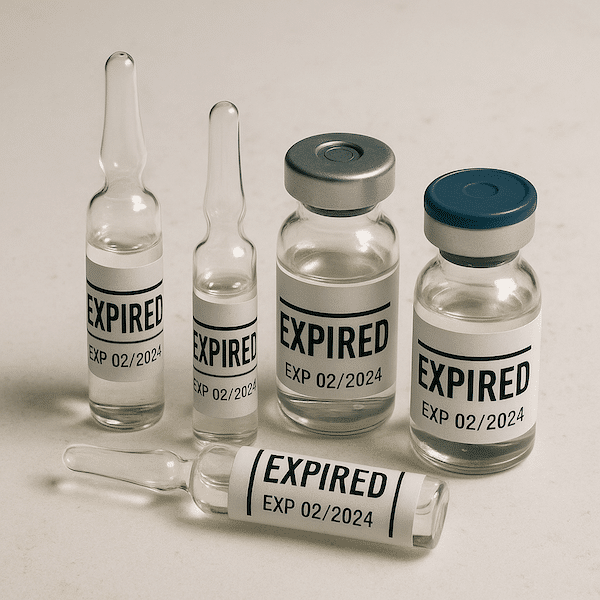I occasionally hear stories about dentists being being cited by licensing boards for having expired emergency drugs – mostly for office based anesthesia. While I understand that having all of the necessary emergency equipment available – including unexpired drugs – I often wonder about the extent of the problem. You rarely hear about it as an isolated incident, but more so as a part of overall compliance infractions.
But I do wonder – is it 1 drug or is it many? Don’t get me wrong – I’m not advocating for laxity when it comes to emergency armamentarium – including drugs. But I do think context is extremely important. I believe that licensing boards use expired drugs as a garnish to embellish a platter of infractions. And I think that’s the right approach. Bear with me and I’ll explain.
It has long been acknowledged that often times that injectable drugs maintain their strength for years beyond their stated expiration date. See for example a stability-study of expired ampoules manufactured more than 40 years ago – ScienceDirect https://share.google/Mw7uCXfzZ3OYapdWT
I recently observed a post on social media where an individual doctor stated “Never give an expired drug”. Now if there’s one thing I’ve learned it’s important to careful about saying “never” and “always”. But it caught my eye – and my ire to some extent, because it demonstrates a lack of understanding about drug stability, formulation, and pharmaceutics. Never means “never”. So, was this person saying that perhaps in an emergency situation that, for example, one should not give atropine in the event it was noted the drug was out of date? What if that one vial was the only one present?
When I was receiving my undergraduate degree in Pharmacy we had a number of PhD faculty who had an exit strategy from industry into academia. Actually it was more like a revolving door. But we had several renouned professors (Robert Wagner, Joseph Burckhalter, Joeseph Sinsheimer, Robert Counsel, Norman Ho, William Higuchi) and I consider myself lucky to have been one of their many, many students. And among the plethora of things we studied, drug stability was one.
Drugs in solution are susceptible to degradation at a much faster rate than those in solid form. Generally speaking, a drug’s “shelf life” is the time it takes for a it’s strength or concentration to degrade by 10% – to 90% of it’s initial strength. And so, in their formulations, certain excipients are added to prevent degradation – for example antioxidants, etc. But one little trick the pharmaceutical companies employ to increase “shelf life” is to actually add an small quantity of active drug. So while the label may state a 1 cc vial to have 10 mg of drug….shhhh….it actually has more.
So what does that mean? Well, it means the stated drug strength on the label on the vial is probably very close to what’s in it if it’s “expired”. But here’s one other very important fact:
It has long been acknowledged that often times that injectable drugs maintain their strength for years beyond their stated expiration date. See for example a stability-study of expired ampoules manufactured more than 40 years ago – ScienceDirect https://share.google/Mw7uCXfzZ3OYapdWT.
This is not just one study. There are many.
So…back to the social media post. I respectfully voiced my opinion on the statement “Never give an expired drug”. Certainly don’t make a habit of keeping expired drugs in your emergency kit. That is negligence and would point to an overall lack of diligence – nobody would ever give you the benefit of the doubt in that situation. And yes, maybe in a perfect world – you NEVER give an expired drug. But if YOU are in an emergency situation and find that the ONLY drug you can give for a certain algorithm is “expired” – take my advise – GIVE IT. You stand a far greater chance to save the patient’s life as the result for the reasons stated.
One last point: If an ampule of epinephrine has an expiration of 6/25, when does it expire – the beginning or the end of the month? Answer: the end.
Sounds kinda arbitrary doesn’t it?

